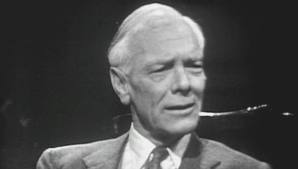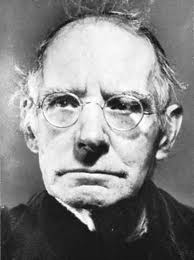The Fellow-Travellers, Stalinism and Child Abuse
 VS
VS 
..................Malcolm Muggeridge..............................................Sean O'Casey
Sean O'Casey, Malcolm Muggeridge and the Moscow Show Trials
Betwen March and June 1938, Sean O'Casey engaged in a prolonged dispute with Malcolm Muggeridge in several newspapers regarding the significance of Stalin's Show Trails, with the latter denouncing the trials as a fraud and O'Casey - of course - supporting them. Most of the published corresponence is contained in the book "The Letters of Sean O'Casey" in the chapter "On the Run from London to Devon - 1938-39". The original article by Muggeridge "The Significance of the Soviet Trials" (Daily Telegraph, 9 March) is not included in the book, nor surprisingly is O'Casey's initial reply "The Sword of the Soviet" (Daily Worker, 25 March). I have included both articles below.
When Great Britain declared war on Germany in September 1939, Muggeridge volunteered for the British army as a 36 year old private. (He was quickly transferred to the Intelligence service.) Sean O'Casey had been living in Britain for over a decade at the time but his response was quite different!
Sean O'Casey, George Bernard Shaw and the Nazi-Soviet Pact
In late 1939, after the signing of the Nazi-Soviet Pact in August, O'Casey and Bernard Shaw had articles in the British press denouncing the British war effort and saying that the UK should make peace with Hitler as Stalin had so wisely done. (Shaw's missive included a few words of praise for Hitler). When Hitler invaded the Soviet Union in June 1941 our two Anglo-Irish Intellectuals promptly changed their tune.
[Shaws article "Uncommon Sense About the War" was published in the New Statesman and Nation on 7 October 1939.
O'Casey's "What Are Our War Aims" was in Picture Post on 11 November of that year. See links to both below.]
George Orwell and the Fellow-Travellers
George Orwell tried to explain the behaviour of the Stalinist "liberal" intelligentsia. I paraphrase, but Orwell wrote that English intellectuals had lost their religion and their patriotism without losing the need for a homeland and something to believe in. Thus they adopted the Soviet Union as a substitute Homeland, Marxist as a substitute Religion and Stalin as their new God. ***
Actually I don't think that Orwell went far enough. Supporters of genocide and slave labour had not "lost" their religion or anything else. They were consumed with hatred for their Church and Society and they supported a Communist butcher because he shared those hatreds. Thus for example, they did not support Franco because HE was a Catholic and a pro-western dictator. The fact that he killed far fewer people was irrelevant!
Dr Noel Browne and Stalin
In an article in the Sunday Tribune on 22 February 1987 ("Browne Looks Back in Astonishment at Flourishing Soviets"), Dr Noel Browne said:
“Socialism does require regimentation and sacrifice by all the community. Also changing a society that is a sub-continent is not something that can be done overnight and I expect terrible things to happen on the way such as the Stalinist period."
The following letter from a Mr Sean Ward was published in the Sunday Independent on 12 May 1996. It was in response to what seems to have been the usual hymn of praise to a Secular Saint published the previous Sunday.
Sir - Before we finish the process of making Dr Noel Browne a lay saint, we would do well to remember that had he had his political way we would now be painfully emerging into the democratic light after two generations of personal and economic repression in an Eastern European style dictatorship.
Dr Browne's early achievements and his undoubted compassion should not be allowed to obscure the more dubious aspects of his political persona. For most of his political life after leaving Government, as a perusal of his speeches in Dail Eireann and newspapers of the time will show, he extolled the "virtues" of what he chose to call the "Eastern European Socialist societies" and asserted that our undoubted problems of social deprivation would only be solved if we had the sense to embrace the system with, presumably, himself as the Celtic Ceausescu or the Hibernian Hohxa.
By stretching the benefit of the doubt to snapping point, it is just about possible to accept that Dr Browne was unaware of the awfulness of what he was proposing. But after all that has become known in the recent past, surely even he must now realise the depths of brutality that characterised the regimes except, of course, for those in the leadership.
Even now a word of apology or regret for so wilfully misleading the people would be welcome.
Doctor Noel Browne died on 21st May 1997. His essay "A Virgin Ireland" that contained the the false allegations of paedophilia against John Charles McQuaid (used by John Cooney in his "biography" of the Archbishop), was his last poisonous legacy to this country. In a way it was appropriate. His Stalinism had always been motivated by hatred of the Catholic Church. It certainly was NOT based on love of the working class!
Malcolm Muggeridge on the Fellow-Travellers
In his autobiography published in 1972 Muggeridge wrote as follows:
"Wise old Shaw, high-minded old Barbusse, the venerable Webbs, Gide the pure in heart and Picasso the impure, down to poor little teachers, crazed clergymen and millionaires, drivelling dons and very special correspondents like Duranty, all resolved, come what might, to believe anything, however preposterous, to overlook anything, however villainous, to approve anything, however obscuratinist and brutally authoritarian, in order to be able to preserve intact the confident expectation that one of the most thorough-going, ruthless and bloody tyranies ever to exist on earth could be relied on to champion human freedom, the brotherhood of man, and all the other good liberal causes to which they had dedicated their lives. ALL RESOLVED, in other words, TO ABOLISH THEMSELVES AND THEIR WORLD, THE REST OF US WITH IT. Nor have I from that time ever had the faintest expectation that, in earthly terms, anything could be salvaged; that any earthly battle could be won, or earthly solution found. It has all just been sleep-walking to the end of the night."
("Chronicles of Wasted Time, The Green Stick").
The Fellow-Travellers and False Allegations of Child Abuse
The left-wing intellectuals who supported Stalin - and later Mao, Castro or Pol Pot - were motivated by hatred of their own society. In Ireland that hatred was particularily focused on the Catholic Church. (In other countries people like Sartre or Brecht focused more on the "bourgeoisie" but anti-clericalism was always part of the lethal mix of hatreds). Before the fall of the Soviet Union, these people could at least pretend that their motivation was love of the working class. Their modern successors have few Communist dictators to worship and their Nihilism is out in the open. Now it takes the form of making false allegations of child abuse against the objects of their hatred.
Dr Noel Browne represents the transition between one form of hatred and the other. No Irish historian actually believes his allegations against the late Archbishop McQuaid, but they represent the beginning of this kind of witch-hunt in Ireland.
Rory Connor
April 2011
"Significance of the Soviet Trials" by Malcolm Muggeridge, The Daily Telegraph - 9 March 2008
"The Sword of the Soviet" by Sean O'Casey, Daily Worker, 25 March 1938Dr. Noel Browne, The Soviet Union and Stalinism, Alliance Support website - 3 October 2006
*** In his essay "Inside the Whale" (1940) Orwell wrote that by about 1930 ...
"The debunking of Western civilization had reached its climax and ‘disillusionment’ was immensely widespread. Who now could take it for granted to go through life in the ordinary middle-class way, as a soldier, a clergyman, a stockbroker, an Indian Civil Servant, or what-not? And how many of the values by which our grandfathers lived could not be taken seriously? Patriotism, religion, the Empire, the family, the sanctity of marriage, the Old School Tie, birth, breeding, honour, discipline—anyone of ordinary education could turn the whole lot of them inside out in three minutes.
"But what do you achieve, after all, by getting rid of such primal things as patriotism and religion? You have not necessarily got rid of the need for something to believe in. There had been a sort of false dawn a few years earlier when numbers of young intellectuals, including several quite gifted writers (Evelyn Waugh, Christopher Hollis, and others), had fled into the Catholic Church. It is significant that these people went almost invariably to the Roman Church and not, for instance, to the C. of E., the Greek Church, or the Protestants sects. They went, that is, to the Church with a world-wide organization, the one with a rigid discipline, the one with power and prestige behind it. Perhaps it is even worth noticing that the only latter-day convert of really first-rate gifts, Eliot, has embraced not Romanism but Anglo-Catholicism, the ecclesiastical equivalent of Trotskyism.
"But I do not think one need look farther than this for the reason why the young writers of the thirties flocked into or towards the Communist Party. If was simply something to believe in. Here was a Church, an army, an orthodoxy, a discipline. Here was a Fatherland and— at any rate since 1935 or thereabouts—a Fuehrer. All the loyalties and superstitions that the intellect had seemingly banished could come rushing back under the thinnest of disguises. Patriotism, religion, empire, military glory—all in one word, Russia. Father, king, leader, hero, saviour—all in one word, Stalin. God—Stalin. The devil— Hitler. Heaven—Moscow. Hell—Berlin. All the gaps were filled up. So, after all, the ‘Communism’ of the English intellectual is something explicable enough. It is the patriotism of the deracinated." [emphasis is mine]
